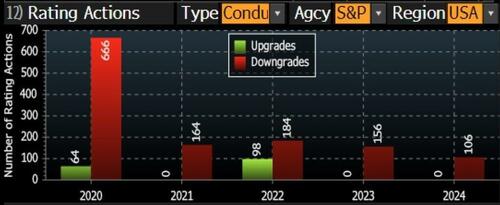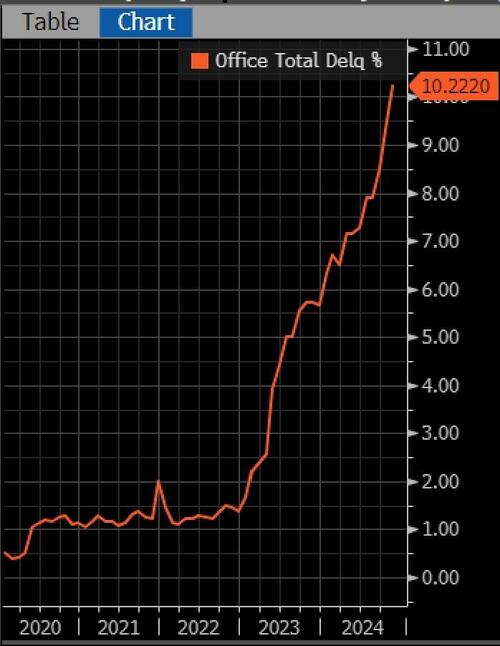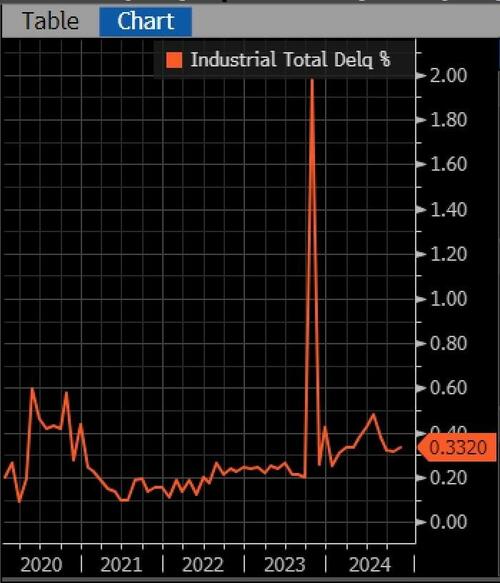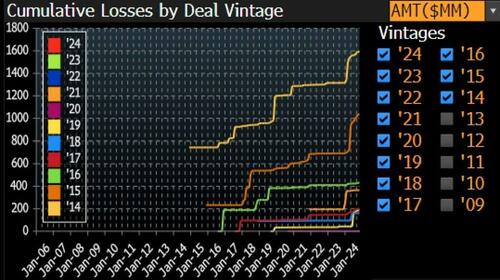The Commercial Mortgage Crisis Deepens
Authored by Peter Earle via the American Institute for Economic Research (AIER),
The delinquency rate for commercial mortgage-backed securities (CMBS) tied to office properties reached 10.4 percent in November 2024, approaching the 10.7 percent peak reached during the 2008 financial crisis. The ascent is the fastest two-year increase on record, with rates climbing 8.8 percentage points since late 2022, significantly outrunning the 6.3-point rise seen during the financial crisis nearly 15 years ago.
The office real estate sector has been grappling with a severe downturn for several years now, but are accelerating recently as they are driven by persistently high vacancy rates and declining rents. Property values, particularly for older office buildings, have plummeted, with many losing 50 to 70 percent of their market value and in some cases becoming effectively worthless. Those conditions have left real estate portfolio managers and building owners unable to borrow, refinance or sell properties, contributing to rising delinquencies and foreclosures. (Mortgages become effectively delinquent when payments are missed beyond a standard 30-day grace period.)
Three key factors contributed to the widespread impairment of office properties and, in turn, securitized mortgage products:
-
malinvestment due to artificially low interest rates and excessive credit expansion,
-
zoning restrictions hampering property repurposing,
-
and the widespread adoption of remote work following COVID-19 lockdowns.
During the 2020–2022 period of near-zero benchmark rates (and in real terms, negative interest rates), lenders underwrote commercial real estate loans with minimal debt service coverage ratios, frequently projecting property income to just cover interest payments. Those assumptions faltered as rates rose, exposing the speculative nature of many of the core suppositions undergirding those loans. Adding to that, rigid zoning and building regulations (in addition to obstinance among owners, in some cases) have slowed the transition of obsolete office spaces to other uses, such as residential conversions. Lastly, the COVID-19 pandemic accelerated a long-term shift toward remote work, reducing demand for traditional office spaces.
Loans can be removed from delinquency lists through resumed payments, foreclosure sales (typically at steep losses to investors), or loan restructuring under the so-called “extend-and-pretend“ strategy, which defers foreclosures into future years. This approach has been widely employed, pushing questions about the financial health of some real estate investment entities to 2025 and beyond.
Among commercial real estate (CRE) segments, office properties are the most troubled, with delinquency rates significantly outpacing lodging (6.9 percent), retail (6.6 percent), and multifamily housing (4.2 percent). Of particular note, the industrial sector remains robust with a delinquency rate of just 0.3 percent. However, the distress is not confined to office properties. CRE-CLO (commercial real estate collateralized loan obligation) bonds, which include short-term floating-rate loans across various property types, are seeing distress rates hit record highs. Office loans account for nearly one in five distressed CRE-CLO loans, but multifamily loans are also at risk, with distress rates reaching 16.4 percent in Q3 2024. The weakness stems from the collision of soaring financing costs and underperforming properties. Indeed, as Austrian Business Cycle Theory (ABCT) predicts, artificially low interest rates stimulated aggressive underwriting during the pandemic, a large portion of which has proven wholly unsustainable.
Efforts to convert office buildings into residential spaces are increasing but remain limited by structural and economic constraints. Many office towers are unsuitable for conversion due to their large floor plates or prohibitively high retrofitting costs which often exceed the cost of demolition and rebuilding. In 2024, 73 office-to-residential conversions were completed, with an additional 30 underway. Despite plans to increase the pace in 2025, the cumulative impact remains minimal, addressing just 7.9 percent of the 902 million square feet of vacant office space nationwide.
The “survive till 2025” mindset dominates market sentiment, with landlords hoping for substantial Federal Reserve rate cuts to alleviate financial pressures. However, while the Fed has reduced rates, they remain between 4.5 percent and 4.75 percent, with the Secured Overnight Financing Rate (SOFR) at 4.57 percent. Moreover, concerns regarding $36 trillion in U.S. government debt, tariff threats, and signs of slowing disinflation have pushed long-term Treasury yields back to pre-cut levels, undermining hopes for refinancing relief. Those conditions have left many properties — especially those tied to bridge loans — on the brink of financial distress.
The financial risks associated with office mortgage losses are widely dispersed among global investors, thus diminishing the potential threat to the U.S. banking system. Office mortgages are held by a vast array of investors, including CMBS and CRE-CLO investors, insurance firms, Real Estate Investment Trusts (REITs), private equity firms, and international financial institutions. While U.S. banks have some exposure and have already recognized significant losses, no major collapses have occurred. Smaller banks with geographically and/or commercially concentrated mortgage portfolios remain at heightened risk, and escalating stress could precipitate systemic consequences.
The commercial real estate market’s troubles are not a temporary phenomenon but a structural crisis rooted in monetary policy-induced overbuilding, regulatory barriers, and a permanent shift in work patterns vastly accelerated by pandemic lockdowns. Vulture investors have emerged, but sparingly. The sector faces profound challenges which will unfold both against and in response to the forward trajectory of monetary policy, the consequent shape of the U.S. Treasury yield curve, and broad macroeconomic developments. Hopefully the stage is not being set for the next in an increasingly annualized procession of crises.
Tyler Durden Fri, 12/06/2024 – 15:40
Source: https://freedombunker.com/2024/12/06/the-commercial-mortgage-crisis-deepens/
Anyone can join.
Anyone can contribute.
Anyone can become informed about their world.
"United We Stand" Click Here To Create Your Personal Citizen Journalist Account Today, Be Sure To Invite Your Friends.
Before It’s News® is a community of individuals who report on what’s going on around them, from all around the world. Anyone can join. Anyone can contribute. Anyone can become informed about their world. "United We Stand" Click Here To Create Your Personal Citizen Journalist Account Today, Be Sure To Invite Your Friends.
LION'S MANE PRODUCT
Try Our Lion’s Mane WHOLE MIND Nootropic Blend 60 Capsules
Mushrooms are having a moment. One fabulous fungus in particular, lion’s mane, may help improve memory, depression and anxiety symptoms. They are also an excellent source of nutrients that show promise as a therapy for dementia, and other neurodegenerative diseases. If you’re living with anxiety or depression, you may be curious about all the therapy options out there — including the natural ones.Our Lion’s Mane WHOLE MIND Nootropic Blend has been formulated to utilize the potency of Lion’s mane but also include the benefits of four other Highly Beneficial Mushrooms. Synergistically, they work together to Build your health through improving cognitive function and immunity regardless of your age. Our Nootropic not only improves your Cognitive Function and Activates your Immune System, but it benefits growth of Essential Gut Flora, further enhancing your Vitality.
Our Formula includes: Lion’s Mane Mushrooms which Increase Brain Power through nerve growth, lessen anxiety, reduce depression, and improve concentration. Its an excellent adaptogen, promotes sleep and improves immunity. Shiitake Mushrooms which Fight cancer cells and infectious disease, boost the immune system, promotes brain function, and serves as a source of B vitamins. Maitake Mushrooms which regulate blood sugar levels of diabetics, reduce hypertension and boosts the immune system. Reishi Mushrooms which Fight inflammation, liver disease, fatigue, tumor growth and cancer. They Improve skin disorders and soothes digestive problems, stomach ulcers and leaky gut syndrome. Chaga Mushrooms which have anti-aging effects, boost immune function, improve stamina and athletic performance, even act as a natural aphrodisiac, fighting diabetes and improving liver function. Try Our Lion’s Mane WHOLE MIND Nootropic Blend 60 Capsules Today. Be 100% Satisfied or Receive a Full Money Back Guarantee. Order Yours Today by Following This Link.











